高中英语语法讲解与练习之动名词与现在分词
动名词和现在分词区别

singing 在句中作宾语的补语,和宾语一 起构成复合宾语。
• 动名词 动名词也是动词的另一种非限定形式,故名
思义,它既源于动词,又具有名词的功能,因此, 它在句子中起名词的作用,可单独或引起短词 (动名词短语)用作主语,表语,宾语。
例如:
–Learning a foreign language well is no easy job. 学好一门外语并非一件容易的事情。 动名词短语learning a foreign language well在 句中作主语。
5句中的encouraging 是现在分词,6句中的 learning是动名词。凡 是现在分词,都起形容
词的作用,意思也类似
形容词,有“···的”意思。 如上面5句,也可字面 翻译为:形势是令人鼓
舞的。但6分词和动名词都可以当定语,修饰名词,又 怎样才能区别它们呢?
–My favourite sport is skating。
我最喜欢的运动是溜冰。
–Have you finished correcting the students’ paper?
学生的卷子改完没有? 动名词 correcting 作动词finish的宾语
–We had better put off discussing it till next week. 我们最好把这事推迟到下最期讨论。 动名词 discussing作介词off的宾语
• 现在分词和动名词的区别 当我们了解现在分词和动名词的定义以
及在句子中充当的不同功能以后,我们就容 易区分它们究竟是现在分词还是动名词了。
例如: 1、My mother goes shopping everyday.
我妈妈天天去购物。 2、My mother does shopping everyday.
高中英语语法——动名词与现在分词的区分
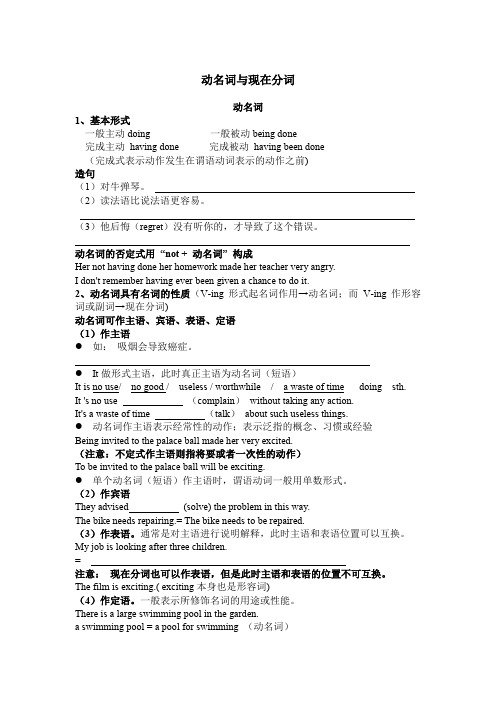
动名词与现在分词动名词1、基本形式一般主动doing 一般被动being done完成主动having done 完成被动having been done(完成式表示动作发生在谓语动词表示的动作之前)造句(1)对牛弹琴。
(2)读法语比说法语更容易。
(3)他后悔(regret)没有听你的,才导致了这个错误。
动名词的否定式用“not + 动名词” 构成Her not having done her homework made her teacher very angry.I don't remember having ever been given a chance to do it.2、动名词具有名词的性质(V-ing形式起名词作用→动名词;而V-ing作形容词或副词→现在分词)动名词可作主语、宾语、表语、定语(1)作主语●如:吸烟会导致癌症。
●It做形式主语,此时真正主语为动名词(短语)It is no use/ no good / useless / worthwhile / a waste of time doing sth.It 's no use (complain)without taking any action.It's a waste of time (talk)about such useless things.●动名词作主语表示经常性的动作;表示泛指的概念、习惯或经验Being invited to the palace ball made her very excited.(注意:不定式作主语则指将要或者一次性的动作)To be invited to the palace ball will be exciting.●单个动名词(短语)作主语时,谓语动词一般用单数形式。
(2)作宾语They advised (solve) the problem in this way.The bike needs repairing.= The bike needs to be repaired.(3)作表语。
高中英语语法专题---现在分词、过去分词和动名词的用法
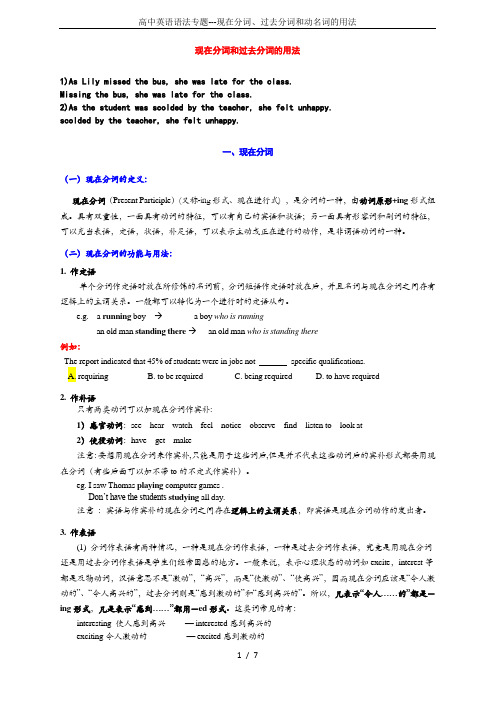
现在分词和过去分词的用法1)As Lily missed the bus, she was late for the class.Missing the bus, she was late for the class.2)As the student was scolded by the teacher, she felt unhappy.scolded by the teacher, she felt unhappy.一、现在分词(一)现在分词的定义:现在分词(Present Participle)(又称-ing形式、现在进行式) ,是分词的一种,由动词原形+ing形式组成。
具有双重性,一面具有动词的特征,可以有自己的宾语和状语;另一面具有形容词和副词的特征,可以充当表语,定语,状语,补足语,可以表示主动或正在进行的动作,是非谓语动词的一种。
(二)现在分词的功能与用法:1. 作定语单个分词作定语时放在所修饰的名词前,分词短语作定语时放在后,并且名词与现在分词之间存有逻辑上的主谓关系。
一般都可以转化为一个进行时的定语从句。
e.g. a running boy→ a boy who is runningan old man standing there →an old man who is standing there例如:The report indicated that 45% of students were in jobs not specific qualifications.A. requiringB. to be requiredC. being requiredD. to have required2. 作补语只有两类动词可以加现在分词作宾补:1)感官动词:see hear watch feel notice observe find listen to look at2)使役动词:have get make注意:要想用现在分词来作宾补,只能是用于这些词后,但是并不代表这些动词后的宾补形式都要用现在分词(有些后面可以加不带to的不定式作宾补)。
动名词和现在分词的句法功能讲义 高考英语语法复习

高考英语二轮备考:动名词和现在分词的句法功能在英语语法中,动名词和现在分词的表达形式都是动词-ing形式。
在句法功能上,二者有相似之处,即都可以在句中作表语和定语,因而初学者常常会将二者弄混。
同时,它们也有着各自专属的句法功能,而且即便是在句法功能相同的情况下,二者所表达的意义也完全不同。
对此,为大家梳理了动名词和现在分词各自的句法功能以及它们在句中作表语和定语时的区别。
一、动名词的专属句法功能(一)动名词作主语动名词作主语时往往表示一种概念、习惯或者经验,表示一般的、抽象的或习惯性的动作。
非谓语动词中的不定式也可以作主语,但不定式作主语时表示具体的、一次性的或尚未发出的动作。
例句:Singing is my hobby,and to sing on a big stage is my dream.(二)动名词作宾语常见的接动名词作宾语的动词有:admit(承认),advise(建议),suggest(建议),consider(考虑),enjoy(喜欢),imagine(想象),mind(介意),permit(允许),risk(冒险),practice(练习),escape(逃避),delay(推迟)。
常见的接动名词作宾语的动词短语有:look forward to(期待),give up(放弃),keep on(持续),put off(推迟)。
此外,动名词既可以作动词的宾语,也可以作介词的宾语。
例句:After looking at the toy for some time,he turned around and found his parents were missing.(本句中,“looking”就是作介词“after”的宾语。
)二、现在分词的专属句法功能(一)现在分词作宾语补足语现在分词可以在hear、see、notice、watch、feel、smell、look at、listen to、observe、find等表示感官和心理状态的动词以及keep、have、leave、set、send这些动词后面作宾语补足语,和宾语共同构成复合宾语。
英语语法与词汇详解 动名词和分词

英语语法与词汇详解动名词和分词一、分词(现在分词和过去分词)1、分词短语作定语现在分词作定语一般表示正在进行的动作,即用来叙述和谓语动词差不多同时发生的动作,而过去分词短语作定语时一般表示被动或完成了的动作。
->例子:The famous Times Square street entertainer is renowned for singing wearing little more than cowboy boots, a hat and a strategically placed guitar.[这位著名的时代广场街头艺人以“凉爽穿着”而闻名,标志穿着包括一双牛仔马靴和一顶牛仔帽,当然,还有一把“举足轻重”的吉他。
]2、分词短语作状语分词短语作状语时,可表示时间、原因、条件、伴随、方式或结果等。
此时如果分词表示的动作与句子的主语之间有主谓关系,即分词的动作由主语发出,用现在分词形式;如果分词表示的动作与句子的主语之间有动宾关系,即句子的主语是分词动作的承受者,分词采用过去分词形式。
->例子:People can even get a computer by which to control the contraption, making the teeth change colors or even blink.[人们还可通过电脑远程控制该装置,使得牙齿变色甚至不断闪烁。
]3、带连词的分词短语作状语分词短语可用在after, before, when, while, when, ever, once,until, if, as if等之后。
->例子:French skyscraper climber Alain Robert scaled a 31-floor office building outside Paris on Wednesday using only his bare hands, his last climb before spending a weekin prison in Texas.[本周三,法国摩天大楼攀登高手阿兰·罗伯特徒手爬上位于巴黎近郊一幢31层的办公大楼。
高中英语高考语法现在分词动名词讲与练

高中英语高考语法现在分词动名词讲与练①doing: 表示主动、进行。
作状语时, 表示与谓语动词同时发生,但有时也表示一个动作一完成, 另一动作马上进行。
doing在句中主要用作定语和状语。
②being done: 表示被动、进行。
在句中主要用作定语和介词宾语。
③having done: 表示主动、完成。
在句中通常用作各种状语, 表示比谓语动词先发生。
④having been done: 表示被动, 完成。
在句中通常用作状语, 表示比谓语动词先发生。
★A. 现在分词作定语: 只有doing, being done才能用作定语。
doing 作定语时, 如果是一个词就放于被修饰的名词前, 如是短语则放于被修饰的名词后。
being done只能放于被修饰的名词后。
1)The weeping girl is a nurse at the hospital.2)The girl weeping at the gate is a nurse at the hospital.3)The jeep being repaired at the garage will be given to Newton High School.◆以下作定语的doing结构不是表示进行, 而是表示经常性的动作或现在(当时)的状态。
1)The factory making toys is run by the town.2)The buildings standing at the foot of the mountain were built in the 1940s.◆现在分词doing作定语时, 表示被修饰的名词的动作。
a suffering farmer a sleeping student a swimming boythe laughing audience a dancing girl a flying kite◆动名词doing也可作定语, 但它表示被修饰名词的用途或性质。
《现在分词与动名词》课件

动名词的特点
总结词
动名词具有时态和语态的变化,可以带宾语或状语,也可以被副词修饰。
详细描述
动名词的时态和语态变化包括一般式(doing)、完成式(having done)和被动式(being done)。动名词可 以带宾语或状语,表示动作或行为的对象或方式。此外,动名词也可以被副词修饰,表示动作或行为的程度或状 态。
忽视现在分词与动名词时态和语态的错误分析
总结词
忽视现在分词与动名词的时态和语态是常见 的语法错误之一。
详细描述
现在分词和动名词都有不同的时态和语态形 式,如现在进行时、过去完成时、被动语态 等。在使用现在分词或动名词时,应正确选 择时态和语态形式,以准确表达意思。如果 忽视时态和语态,可能会导致语法错误或语 义模糊。
使用时应注意上下文和语境的准确性。
05
现在分词与动名词的练习与巩固
选择题练习
总结词
考察基础概念
详细描述
选择题练习主要考察学生对现在分词与动名词基础概念的理 解,包括两者的定义、用法和区别等。通过选择题练习,学 生可以加深对相关知识的理解和记忆。
填空题练习
总结词
检验知识应用
详细描述
填空题练习主要检验学生对现在分词与动名词的应用能力,题目会提供一些句子或段落 ,要求学生填写正确的分词或动名词形式。这种练习方式有助于提高学生的语言应用能
忽视现在分词与动名词使用场合和语境的错误分析
总结词
忽视现在分词与动名词的使用场合和语境是 常见的语法错误之一。
详细描述
现在分词和动名词在不同的场合和语境中有 不同的用法。例如,在描述某个正在进行的 动作时,应使用现在分词;在描述某个已经 完成的动作或状态时,应使用过去分词。此 外,在某些语境中,使用现在分词或动名词 可能会产生歧义或不合逻辑的情况,因此在
现在分词和动名词精品PPT教学课件

V + -ing 形式用法归纳
现 1、作表语 (与动名词的区别) 在 2、作宾补(能跟现在分词作宾补的动词) 分 3、作定语(与动名词的区别) 词 4、作状语
动 1、作主语
名 2、作表语 (与现在分词的区别)
词 3、作宾语(能跟动名词作宾语的动词)
4、作定语(与动名词的区别)
2020/12/6
15
现在分词与动名词
主讲:
2020/12/6
1
现在分词与动名词的基本 形式你知道吗?
2020/12/6
那么简单,谁不知道。是由动 词末尾加 -ing 形式构成,因此
又叫动词的 -ing 形式。
V+-ing
2
千万要注意V-ing
形式的规则哟!
不能单独作谓语,
没有人称和数的
变化,可以有自
己的宾语和状语。
Writing an English composition is not easy.
It’s useless taking this kind of medicine.
2020/12/6
5
作表语
(1)动名词
(2)现在分词
My job is teaching. The play is exciting.
•China 2020/12/6 is a developing country.
13
作状语
现在分词作状语。表时间、原因、条件、结 果、伴随(方式)等。
Hearing the cry for help, he rushed out.(时间)
Being ill, he went home. (原因)
还有时态和语态
的变化。
2020/12/6
动名词和现在分词的用法语法课件全面版

laying eggs.
was very interesting.
=Laying eggs is her ≠Interesting was
full-time job.
the story he told us.
作宾语:动名词
•I have just finished doing my home work. •I suggested asking his brother for some money.
This is a new washing machine.
作定语
⑵现在分词作定语表示动作。如果是单词,放在被 修饰的名词前;如果是短语,放就放在被修饰的名 词之后。
•a developing country = a country which is developing
•a sleeping boy= a boy who is sleeping
V + -ing 形式用法归纳
现 1、作表语 (与动名词的区别) 在 2、作宾补(能跟现在分词作宾补的动词) 分 3、作定语(与动名词的区别) 词 4、作状语
动 1、作主语 名 2、作表语 (与现在分词的区别) 词 3、作宾语(能跟动名词作宾语的动词)
4、作定语(与动名词的区别)
The end
只要我们坚持了,就没有克服不了的困难。或许,为了将来,为了自己的发展,我们会把一件事情想得非常透彻,对自己越来越严,要求越来越高,对任何机会都不曾错过,其 目的也只不过是不让自己随时陷入逆境与失去那种面对困难不曾屈服的精神。但有时,“千里之行,始于足下。”我们更需要用时间持久的用心去做一件事情,让自己其中那小 小的浅浅的进步,来击破打破突破自己那本以为可以高枕无忧十分舒适的区域,强迫逼迫自己一刻不停的马不停蹄的一直向前走,向前看,向前进。所有的未来,都是靠脚步去 丈量。没有走,怎么知道,不可能;没有去努力,又怎么知道不能实现?幸福都是奋斗出来的。那不如,生活中、工作中,就让这“幸福都是奋斗出来的”完完全全彻彻底底的 渗入我们的心灵,着心、心平气和的去体验、去察觉这一种灵魂深处的安详,侧耳聆听这仅属于我们自己生命最原始最动人的节奏。但,这种聆听,它绝不是仅限于、执着于 “我”,而是观察一种生命状态能够扩展和超脱到什么程度,也就是那“幸福都是奋斗出来的”深处又会是如何?生命不止,奋斗不息!又或者,对于很多优秀的人来说,我们 奋斗了一辈子,拼搏了一辈子,也只是人家的起点。可是,这微不足道的进步,对于我们来说,却是幸福的,也是知足的,因为我们清清楚楚的知道自己需要的是什么,隐隐约 约的感觉到自己的人生正把握在自己手中,并且这一切还是通过我们自己勤勤恳恳努力,去积极争取的!“宝剑锋从磨砺出,梅花香自苦寒来。”当我们坦然接受这人生的终局, 或许,这无所皈依的心灵就有了归宿,这生命中觅寻处那真正的幸福、真正的清香也就从此真正的灿烂了我们的人生。一生有多少属于我们的时光?陌上的花,落了又开了,开 了又落了。无数个岁月就这样在悄无声息的时光里静静的流逝。童年的玩伴,曾经的天真,只能在梦里回味,每回梦醒时分,总是多了很多伤感。不知不觉中,走过了青春年少, 走过了人世间风风雨雨。爱过了,恨过了,哭过了,笑过了,才渐渐明白,酸甜苦辣咸才是人生的真味!生老病死是自然规律。所以,面对生活中经历的一切顺境和逆境都学会 了坦然承受,面对突然而至的灾难多了一份从容和冷静。这世上没有什么不能承受的,只要你有足够的坚强!这世上没有什么不能放下的,只要你有足够的胸襟! 一生有多少 属于我们的时光?当你为今天的落日而感伤流泪的时候,你也将错过了明日的旭日东升;当你为过去的遗憾郁郁寡欢,患得患失的时候,你也将忽略了沿途美丽的风景,淡漠了 对未来美好生活的憧憬。没有十全十美的生活,没有一帆风顺的旅途。波平浪静的人生太乏味,抑郁忧伤的人生少欢乐,风雨过后的彩虹最绚丽,历经磨砺的生命才丰盈而深刻。 见过了各样的人生:有的轻浮,有的踏实;有的喧哗,有的落寞;有的激扬,有的低回。肉体凡胎的我们之所以苦恼或喜悦,大都是缘于生活里的际遇沉浮,走不出个人心里的 藩篱。也许我们能挺得过物质生活的匮乏,却不能抵挡住内心的种种纠结。其实幸福和欢乐大多时候是对人对事对生活的一种态度,一花一世界,一树一菩提,就是一粒小小的 沙子,也有自己精彩的乾坤。如果想到我们终有一天会灰飞烟灭,一切象风一样无影亦无踪,还去争个什么?还去抱怨什么?还要烦恼什么?未曾生我谁是我?生我之时我是谁? 长大成人方是我,合眼朦胧又是谁?一生真的没有多少时光,何必要和生活过不去,和自己过不去呢。你在与不在,太阳每天都会照常升起;你愁与不愁,生活都将要继续。时
《现在分词与动名词》课件

动名词的形式和用法
形式
通常以ing结尾,且也有不规则变化,如swimming、sing是形容词形式,表示主动、进行或状态。
动名词
2
是名词形式,可以作主语、宾语、表语、
介词宾语等。
3
例子
现在分词:Running water is soothing. / 动名词:Running is good exercise.
例句和练习
现在分词例句
动名词例句
• Sitting at the bus stop, Jane felt bored. • The barking dog scared me. • The children playing outside were having fun.
主语:Smoking is bad for health. / 表语:My favorite hobby is dancing. / 宾语:I enjoy dancing. / 介词宾语:She is interested in singing. / 复合宾语:I heard him singing in the shower.
用法
1. 作主语:Swimming is my favorite sport. / 2. 作宾语:I don't like cooking. / 3. 作介词宾语: We talked about skiing. / 4. 作表语:Her hobby is dancing.
高中英语语法 动名词&分词

not waiting 5.I regret_____________ (not wait) for you.
praising 6. The boy deserved ___________ (praise). seeing 7. The film is worth _____________ (see).
trouble /difficulty
1)sb.+have a problem /a struggle a good time /a hard time (+in)+V-ing
2) Sb + spend time /money (in ) +v-ing
3) S + be busy (in/with )+V-ing
+doing
talking like this It is no use______________. 象这样谈话没有用. arguing with him It’s a waste of time________________.
和他这样辩论是浪费时间
2. 作表语 动名词作表语时表示比较抽象的一般行为、习惯
1. 作主语 动名词作主语通常表示抽象的或泛指的动作, 一般不与特定的动作执行者联系在一起; Learning new words ___________________ is very useful to me .( 学习生词对我来说很有用. ) Taking exercise every morning ____________________________helps make one healthy. (每天早晨做运动有助于人的健康。)
5. 动名词的复合结构
1)为了明确动名词所表示的动作的执行者,可以在 动名词之前加上一个物主代词或名词所有格,来表 示动名词逻辑上的主语。
高中英语语法--现在分词作定语讲解与练习
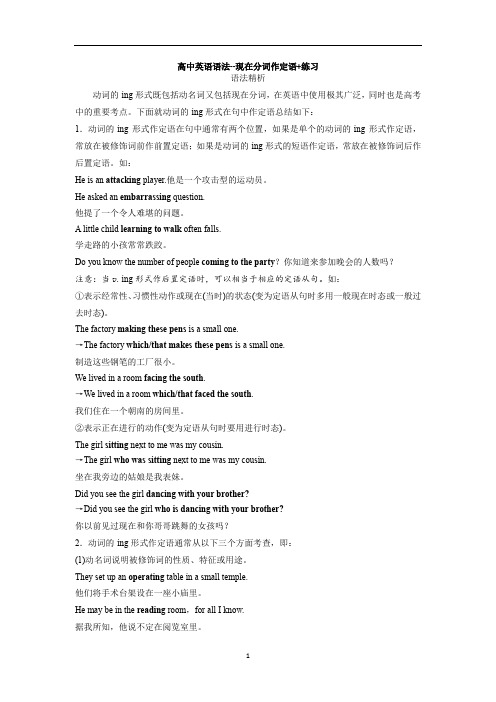
高中英语语法--现在分词作定语+练习语法精析动词的-ing形式既包括动名词又包括现在分词,在英语中使用极其广泛,同时也是高考中的重要考点。
下面就动词的-ing形式在句中作定语总结如下:1.动词的-ing形式作定语在句中通常有两个位置,如果是单个的动词的-ing形式作定语,常放在被修饰词前作前置定语;如果是动词的-ing形式的短语作定语,常放在被修饰词后作后置定语。
如:He is an attacking player.他是一个攻击型的运动员。
He asked an embarrassing question.他提了一个令人难堪的问题。
A little child learning to walk often falls.学走路的小孩常常跌跤。
Do you know the number of people coming to the party?你知道来参加晚会的人数吗?注意:当v.-ing形式作后置定语时,可以相当于相应的定语从句。
如:①表示经常性、习惯性动作或现在(当时)的状态(变为定语从句时多用一般现在时态或一般过去时态)。
The factory making these pens is a small one.→The factory which/that makes these pens is a small one.制造这些钢笔的工厂很小。
We lived in a room facing the south.→We lived in a room which/that faced the south.我们住在一个朝南的房间里。
②表示正在进行的动作(变为定语从句时要用进行时态)。
The girl sitting next to me was my cousin.→The girl who was sitting next to me was my cousin.坐在我旁边的姑娘是我表妹。
超实用高三英语一轮复习语法讲解(动名词)及练习讲义
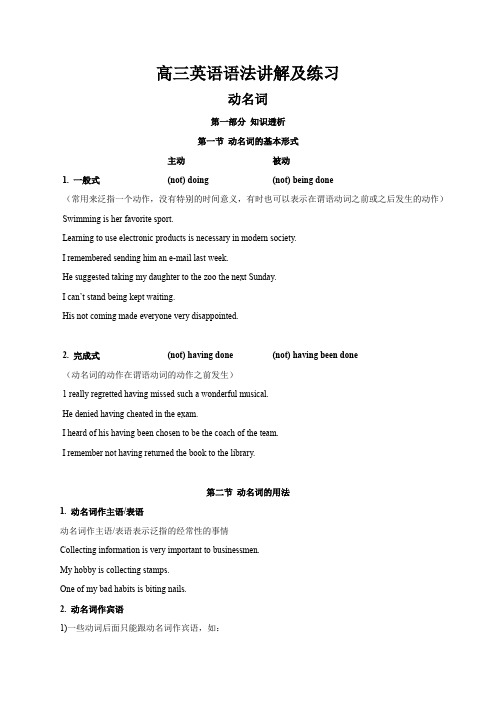
高三英语语法讲解及练习动名词第一部分知识透析第一节动名词的基本形式主动被动1. 一般式(not) doing(not) being done(常用来泛指一个动作,没有特别的时间意义,有时也可以表示在谓语动词之前或之后发生的动作)Swimming is her favorite sport.Learning to use electronic products is necessary in modern society.I remembered sending him an e-mail last week.He suggested taking my daughter to the zoo the next Sunday.I can’t stand being kept waiting.His not coming made everyone very disappointed.2. 完成式(not) having done(not) having been done(动名词的动作在谓语动词的动作之前发生)1 really regretted having missed such a wonderful musical.He denied having cheated in the exam.I heard of his having been chosen to be the coach of the team.I remember not having returned the book to the library.第二节动名词的用法1. 动名词作主语/表语动名词作主语/表语表示泛指的经常性的事情Collecting information is very important to businessmen.My hobby is collecting stamps.One of my bad habits is biting nails.2. 动名词作宾语1)一些动词后面只能跟动名词作宾语,如:ban consider delay deny escapefeel like finish forbid involve appreciatekeep practise recommend quit suggestadmit permit avoid enjoy mentionimagine include mind miss resistRisk prohibit allow advise encouragedislike forgive advocate postpone fancyHe denied having been there.We enjoy walking along the Bund.Don’t risk going to the forest alone.The old should avoid eating oily food.注意:allow, advise,encourage,forbid, permit,recommend 后接动名词作宾语,接不定式作补语。
动名词与现在分词专练
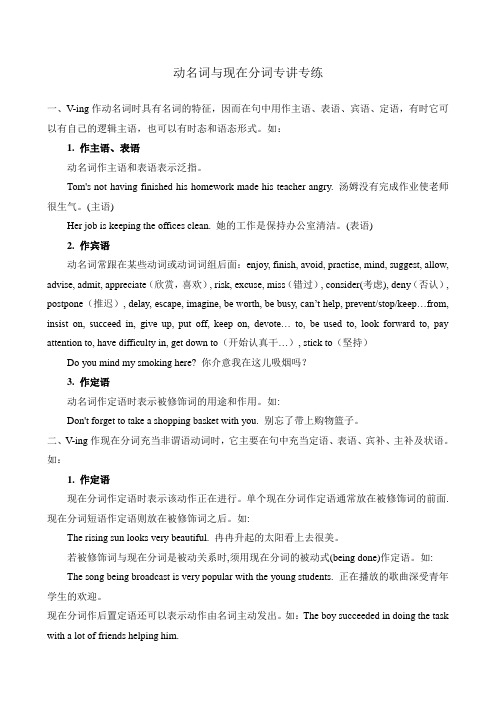
动名词与现在分词专讲专练一、V-ing作动名词时具有名词的特征,因而在句中用作主语、表语、宾语、定语,有时它可以有自己的逻辑主语,也可以有时态和语态形式。
如:1. 作主语、表语动名词作主语和表语表示泛指。
Tom's not having finished his homework made his teacher angry. 汤姆没有完成作业使老师很生气。
(主语)Her job is keeping the offices clean. 她的工作是保持办公室清洁。
(表语)2. 作宾语动名词常跟在某些动词或动词词组后面:enjoy, finish, avoid, practise, mind, suggest, allow, advise, admit, appreciate(欣赏,喜欢), risk, excuse, miss(错过), consider(考虑), deny(否认), postpone(推迟), delay, escape, imagine, be worth, be busy, can’t help, prevent/stop/keep…from, insist on, succeed in, give up, put off, keep on, devote… to, be used to, look forward to, pay attention to, have difficulty in, get down to(开始认真干…), stick to(坚持)Do you mind my smoking here? 你介意我在这儿吸烟吗?3. 作定语动名词作定语时表示被修饰词的用途和作用。
如:Don't forget to take a shopping basket with you. 别忘了带上购物篮子。
二、V-ing作现在分词充当非谓语动词时,它主要在句中充当定语、表语、宾补、主补及状语。
- 1、下载文档前请自行甄别文档内容的完整性,平台不提供额外的编辑、内容补充、找答案等附加服务。
- 2、"仅部分预览"的文档,不可在线预览部分如存在完整性等问题,可反馈申请退款(可完整预览的文档不适用该条件!)。
- 3、如文档侵犯您的权益,请联系客服反馈,我们会尽快为您处理(人工客服工作时间:9:00-18:30)。
动名词与现在分词的区别三、动名词的时态和语态动名词的时态和语态如下:主动语态、被动语态、一般式writing、being written、完成式having written、having been written其否定形式是在doing前加上not1、动名词一般式表示的动作通常是一般性动作,即不是明确地发生在过去、现在或将来的动作,或是与谓语动词所表示的动作同时发生的动作。
如:I hate talking with such people. 我讨厌与这样的人说话。
2、动名词的完成式表示的动作发生在谓语动词动作之前。
如:I don‟t remember having met him before.3、动名词的逻辑主语同时也是动名词动作的承受者,动名词用被动语态。
(1)它的一般式表示。
如:I don‟t like being laughed at in public. 在公共场合下,我不喜欢被别人嘲笑。
(2)它的完成式表示。
如:I am very pleased at your having been honored with a medal. 我很高兴你能获得这样的奖牌。
(3)在某些动词,我们常用动名词的一般式表示完成式,尽管动作发生在谓语动词动作之前,这似乎是一种强大的习惯。
如:Excuse me for being late. 我来晚了请你原谅。
I don‟t remember ever meeting somewhere. 我记不得原来在什么地方见过。
Thank you for giving us so much help. 谢谢给我们这么大的帮助。
(4)在多数情况下都避免使用动名词被动语态完成式,而用一般式代替,以免句子显得累赘,尤其是在口语中。
如:I forget once being taken (having been taken ) to the city zoo. 我曾被带到过这个动物园,可我忘了。
(5)动名词被动语态一般式与现在分词被动语态一般式同形,但无进行意义,being不可省略。
如:She is afraid of being taken to the public. 她怕被领到大众面前。
四、常见题型:1)动名词做主语时,谓语动词为单数2)在动名词和不定式中,作为介词的宾语是动名词3)动名词的否定直接在其前加否定词,通过代词的宾格或所有格形式给出逻辑主语例:I would appreciate_______ back this afternoon.A.you to call B.you call C.you calling D.you‟re calling4)有些词后只能接动名词admit; appreciate; avoid; celebrate; consider; contemplate; defer; delay; deny; detest; discontinue; dislike; dispute; enjoy; it entails; escape; excuse; explain; fancy; feel like; finish; forgive; can‟t help; hinder; imagine; it involves; keep; it means; mention; mind; miss; it necessitates; pardon; postpone; practice; prevent; recall; report; resent; resist; risk; suggest; understand...5)另外还有一些接-ing形式的常用说法it‟s no good; it‟s no/little/hardly any/ use; it‟s not/hardly/scarcely use; it‟s worthwhile; spend money/time; there‟s no; there‟s no po int in; there‟s nothing worse than; what‟s the use/point...6)有些词后面加不定式和动名词均可(分为三种情况,详细参见现在分词语法讲解及练习)五、动名词与现在分词的同与不同动名词它在形式上与现在分词相同,都是在动词原形的词末加-ing。
在现代语法中,这两种形式同视为"-ing形式"。
相同点:例如:Speaking in the public , he will surely be very cheerful .(现在分词短语,作状语)他在公众场所讲话时总是兴高采烈的。
She hates speaking in the public.(动名词短语,作宾语)她不喜欢在公众场所讲话。
区别:1、表语:动名词和现在分词都可以用于系动词之后作表语,区别方法是:①作表语的动名词与主语指的是同一件事,此时系动词相当于“是”,通常把主语和表语的位置互换,语法和意思不变,例如:My hobby is swimming.可改为Swimming is my hobby.(可将原句中的主语与表语位置互换)②现在分词作表语主要用以说明主语的性质,不能与主语互换位置,例如:The story is interesting .不可改为:Interesting is the story.2、定语:动名词和现在分词都可以用作定语来修饰名词,两者的区别在于:动名词修饰名词时主要表示该名词的用途,而现在分词修饰名词时性质、状态或动作等。试比较:①a swimming boy和a swimming suit②a sleeping child 和 a sleeping car3.主语:动词的-ing形式用作主语时为动名词,现在分词不可以用作主语。
(1)动名词用作主语. Reading French is easier than speaking it. 阅读法文比讲法语容易。
(2)有时it作形式主语,把动名词主语放在句子后面It was a waste of time reading that book. 看那本书是浪费时间。
(3)“There is + no”后可以用动名词作主语There was no knowing what he could do. 他能做什么很难说。
4.宾语:动词的-ing形式用作宾语时为动名词,现在分词不可以用作宾语。
(1)有许多动词可接动名词作宾语I suggested bringing the meeting to an end. 我建议结束会议。
(2)有许多带介词的动词固定搭配接动名词作宾语He has given up playing football. 他现在不踢足球了。
5.状语:当动词的-ing形式用作状语时为现在分词,动名词不可以用作状语。
现在分词及其短语可以用作状语,表示时间、原因、结果、条件、让步、方式或伴随情况等。
其动作可能发生在谓语之前或之后,也可能与谓语动词的动作同时发生。
Climbing to the top of the tower, we saw a magnificent view.我们爬到塔顶后,看到了一片壮丽的景象。
(表时间)Living in the country, we had few social engagements.我们住在乡下,交际的机会很少。
(表原因)下列句子中,哪些是动名词,哪些是现在分词Smoking can cause cancer. waiting room Prices keep on increasing.The child fell, striking his head against the door and cutting it. the rising generationIt‟s a wonder meeting you here. developing countriesHe kept complaining. The main thing is getting there in time.The news is encouraging. swimming poolThere was no arguing with her. living things练习26)Do you feel like ____ out or would you rather ____ dinner at home?A)going。
to have B)to go。
to have C)to go。
having D)going。
have27)Prior to ____ the formal speech,first he will introduce himself。
A)delivering B)deliver C)being delivering D)being delivered28)I don…t mind ____ by bus,but I hate ____ in queues。
A)to travel。
standing B)traveled。
Standing C)traveling。
to stand D)traveling。
standing 29)What about ____ double quantities of everything today?We have hardly time to go____ next week。
A)buying。
to shop B)buy。
Shopping C)buying。
shopping D)to buy。
shopping30)We had some trouble ____ the house and nobody seemed ____where it was。
A)in finding。
knowing B)finding。
to know C)to find。
knowing D)to find。
to know 31)We can…t imagine ____ in the entrance examination,for she has never been to school。
A)she succeeding B)her succeeding C)she succeed D)her to succeed32)I don…t like ____ at me。
A)them laughing B)their laugh C)them laugh D)them to have laughed33)We suggested ____ in hotels but the children were anxious ____ out。
